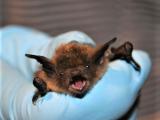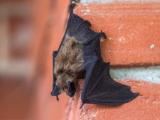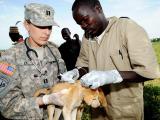Mar 15, 2013
Novel coronavirus gene study yields bat and timing clues
Deep genome sequencing of a novel coronavirus (NCoV) obtained directly from a sick patient's sputum shows a close relationship to European bat coronaviruses, a team led by scientists from the Wellcome Trust Sanger Institute in the United Kingdom reported today. Their findings appear in an early online article in Emerging Infectious Diseases. The researchers sequenced a sample obtained from a Qatari man who became ill in Saudi Arabia and was hospitalized in London in September of last year, using a sequencing method that shortens the interval between clinical sample processing and genome assembly to 1 week. They compared the sequence with ones from a later sample obtained from the man, a clinical sample from a Saudi Arabian man infected with the virus in June 2012, and bat samples in a gene database. Their goals were to find clues about the virus precursors and how long it has circulated in its current form. Phylogenetic analysis revealed a close relationship to European bat coronaviruses among the Vespertilionidae family. Another analysis suggested that the two human samples had a common ancestor, likely well before June 2012, which they said points to multiple zoonotic events rather than just one chain of transmission. Europe and the Middle East would be good regions to conduct more intensive surveillance studies on bats and other animal reservoirs, they noted. More full-genome sequences from other human cases and sampling from bats and other related animals will help more precisely identify the origin of the virus, how it evolved, and the mechanisms of pathogenesis, said the researchers. In November a research group based at Erasmus University in the Netherlands reported complete genetic sequencing of an isolate from the Saudi man who died in June. Their findings suggested that the NCoV sample was closely related to two species of Asian bats and may be even more closely related to a bat coronavirus found in the Netherlands in 2008.
Mar 15 Emerg Infect Dis report
Nov 20, 2012, CIDRAP News story "Sequencing supports novel coronavirus's ties to bat strains"
CDC: Rabies death uncovers organ transplant transmission
The US Centers for Disease Control and Prevention (CDC) said it and health officials in five states are following up on the extremely rare occurrence of rabies transmission through organ transplantation. The investigation and response were triggered by the death from rabies of a Maryland patient who died in early March after undergoing an organ transplant more than a year ago, according to a CDC press release. Tests this week at CDC labs on tissues from the donor and recipient confirmed the transmission. The donor died in Florida in 2011, but rabies wasn't suspected as the cause of death and tests weren't conducted. Three other patients received organs from the infected donor and are being evaluated by doctors and receiving immune globulin and antirabies vaccine. The CDC said it is collaborating with health officials in five other states to identify which close contacts of the donor and four organ recipients need postexposure treatment. Early lab analysis shows the donor and the recipient who died had the same raccoon-type rabies virus, which has only been linked to one other death before in the United States. Officials suspect the donor was exposed to the virus while living in North Carolina, but it's not yet known how he or she was infected. Though donors are screened for infectious risks, human rabies cases are so rare—1 to 3 cases each year—that lab tests for the virus aren't routinely done unless doctors have a clinical suspicion, according to the CDC. Also, the agency noted that it's difficult to get tests results in the short time frame needed to keep the organ viable.
Mar 15 CDC press release
Veterinary antibiotic conference urges stronger global cooperation
Representatives from more than 100 countries, plus several experts and stakeholders, wrapped up a 3-day conference in Paris this week where they discussed the prudent use of antibiotics in veterinary settings. A press release from the meeting, organized by the World Organisation for Animal Health (OIE) in close collaboration with the World Health Organization (WHO) and the United Nations Food and Agriculture Organization (FAO), noted that the OIE has already adopted standards for responsible use of antibiotics in animals and has encouraged member countries to do so as well. According to OIE, conference participants reached consensus on the need to foster cooperation and international solidarity for supervising the production, importation, marketing, distribution, and use of antibiotics. Because antibiotic-resistant bacteria cross geographic boundaries, the group recognized that poor management by a single country can endanger others, the statement said. The group recognized that stronger cooperation could help countries that aren't yet in a position to apply the OIE's standards.
Mar 15 OIE press release
OIE meeting background
New Jersey issues measles health alert
New Jersey health officials have issued an alert about possible measles exposure at sites ranging from shopping malls to health facilities. In a statement yesterday the New Jersey Department of Health (NJDH) said a suspected measles case it announced on Mar 8 has now been confirmed and that a third suspected case has now been identified. It listed several locations the third patient had visited in Somerset County between Mar 6 and Mar 12, including Somerset Medical Center in Somerville, NJ. The NJDH said people visiting the sites during that time should contact a health provider to discuss possible exposure and risk; the agency is working with local health departments and the CDC to locate the patient's contacts. The hospital has alerted its employees and others who were potentially exposed at the facility, and New Jersey health officials are urging the public to make sure they are up-to-date on measles/mumps/rubella (MMR) immunization.
Mar 14 NJDH statement
Mar 8 NJDH statement















